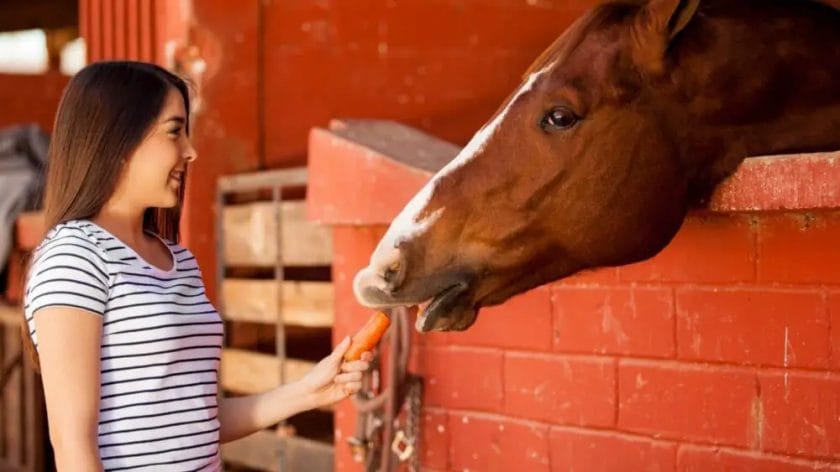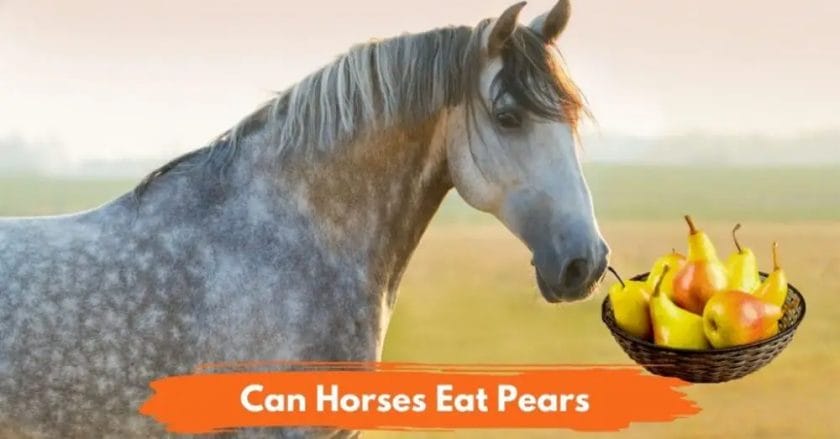Horses have a varied diet that includes grass, hay, and certain fruits. While some horses may enjoy the taste of pears, it ultimately depends on individual preferences. However, it’s important to note that horses should only be given pears in moderation as a treat, as their primary diet should consist of forage. Always consult with a veterinarian before introducing new foods to a horse’s diet.

Nutritional Benefits of Feeding Horses Pears
Pears are not only delicious and refreshing but they also offer several nutritional benefits for horses. Including pears in a horse’s diet can provide them with essential vitamins, minerals, and antioxidants that contribute to their overall health and well-being. Here are some of the key nutritional benefits of feeding horses pears:
1. Vitamins
Pears are a great source of vitamins such as vitamin C, vitamin K, and several B vitamins including folate. Vitamin C is an antioxidant that helps boost the immune system and support overall health. Vitamin K plays a vital role in blood clotting, bone health, and may also have anti-inflammatory properties. B vitamins are important for energy metabolism and promoting proper growth and development.
2. Minerals
Feeding horses pears can also provide them with important minerals like potassium, copper, and magnesium. Potassium is essential for maintaining proper electrolyte balance and muscle function. Copper is important for the production of connective tissues, while magnesium is necessary for enzyme function and muscle relaxation.
3. Antioxidants
Pears are rich in antioxidants, including flavonoids and phytonutrients, which can help protect the body against oxidative stress and reduce the risk of chronic diseases. Antioxidants play a crucial role in neutralizing harmful free radicals in the body, reducing inflammation, and supporting overall health.
4. Hydration
Pears have a high water content, which can help keep horses hydrated, especially during hot weather or strenuous activities. Proper hydration is essential for maintaining healthy bodily functions, including digestion, circulation, and temperature regulation.
5. Digestive Health
Pears are a good source of dietary fiber, which can support proper digestion and maintain a healthy gastrointestinal tract in horses. Fiber helps regulate bowel movements, prevent constipation, and can even aid in weight management.
6. Low in Calories
Pears are relatively low in calories compared to other fruits, making them a suitable option for horses that require a controlled diet. Their sweet and juicy flavor makes them a delicious treat without adding excessive calories to a horse’s daily intake.
7. Natural Energy Boost
The natural sugars present in pears can provide horses with a quick and natural energy boost. This can be particularly beneficial before and during intense physical activities or competitions.
It’s important to note that pears should be fed to horses in moderation and as part of a well-balanced diet. While they offer several nutritional benefits, they should not replace the primary source of nutrition provided by hay, forage, and grain. Always introduce new foods gradually and consult with a veterinarian or equine nutritionist to ensure the appropriate inclusion of pears in a horse’s diet.

How to Introduce Pears into Your Horse’s Diet
Pears are not only a delicious fruit for humans, but they can also be a healthy addition to your horse’s diet. Packed with vitamins and minerals, pears can provide your horse with essential nutrients and serve as a tasty treat. However, it is important to introduce pears gradually and in moderation to avoid any digestive issues. Here are some steps to follow when incorporating pears into your horse’s diet:
Step 1: Choose Ripe and Fresh Pears
When selecting pears for your horse, make sure they are ripe and fresh. Avoid pears that are overly ripe or bruised, as they may not be as appealing to your horse or may cause digestive upset. It’s best to pick pears from organic sources to avoid any potential pesticide residues.
Step 2: Wash and Slice the Pears
Before feeding pears to your horse, ensure that you wash them thoroughly to remove any dirt or residue. Once cleaned, slice the pears into manageable pieces that are easy for your horse to chew and digest. Avoid giving your horse large chunks of pear to minimize the risk of choking.
Step 3: Start with Small Quantities
Introduce pears to your horse’s diet gradually to allow their digestive system to adjust. Start by offering a small quantity of sliced pear, such as half a pear, and observe how your horse responds. If there are no negative reactions, you can gradually increase the amount over time.
Step 4: Monitor for Any Digestive Issues
After feeding pears to your horse, closely monitor their stool and overall digestive health. Some horses may have a more sensitive stomach and may experience loose stools or abdominal discomfort when consuming pears. If you notice any digestive issues, reduce the amount of pear given or eliminate it from their diet altogether.
Step 5: Rotate with Other Fruits and Vegetables
While pears can be a healthy addition to your horse’s diet, it’s essential to provide a balanced variety of fruits and vegetables. Rotate pears with other horse-friendly fruits and vegetables, such as carrots, apples, and leafy greens, to ensure they receive a well-rounded diet. Always consult with your veterinarian or equine nutritionist to determine the appropriate portions and variety for your horse.
Step 6: Use Pears as a Treat
In addition to incorporating pears into your horse’s regular diet, you can also use them as a special treat or reward during training sessions. Pears can serve as a healthy alternative to processed treats and can be a tasty incentive for your horse. Remember to offer pears in moderation and adjust their regular feed accordingly to maintain a balanced diet.
In summary, introducing pears into your horse’s diet can be a nutritious and enjoyable addition. Remember to choose ripe and fresh pears, slice them into manageable pieces, start with small quantities, and monitor your horse’s digestive health. Rotate pears with other fruits and vegetables, and use them as a treat during training. With careful introduction and moderation, pears can be a beneficial part of your horse’s diet.

Potential Risks and Allergies Associated with Horses and Pears
While horses and pears are cherished by many people, it is essential to be aware of the potential risks and allergies associated with their consumption or contact. Understanding these risks can help you take necessary precautions to ensure your safety.
Risks Associated with Horses:
1. Kick or Trample Injuries: Horses are powerful animals and can cause severe injuries if they kick or trample on a person. It is important to maintain a safe distance and handle horses with caution.
2. Allergic Reactions: Some individuals may experience allergic reactions when exposed to horses. Symptoms may include sneezing, itching, hives, or even difficulty breathing. If you suspect an allergy, it is advised to avoid close contact with horses and seek medical advice.
3. Zoonotic Diseases: Horses can transmit certain diseases to humans, known as zoonotic diseases. These may include infections such as Equine Influenza, Strangles, or even Salmonella. It is crucial to practice good hygiene and follow appropriate preventive measures when handling horses.
Risks Associated with Pears:
1. Allergic Reactions: Pears belong to the Rosaceae family, which includes other fruits like apples and peaches. Some individuals may have a cross-reactivity allergy, meaning they might be allergic to multiple fruits within the same family. Symptoms can range from mild oral itching to more severe reactions such as swelling, difficulty breathing, or anaphylaxis. If you have known allergies to fruits, consult a healthcare professional before consuming pears.
2. Pesticide Residues: Like many fruits, pears may be treated with pesticides to protect them from pests and diseases. While the use of pesticides is regulated, some residues may remain on the fruit. Washing and peeling the pears before consumption can help reduce exposure to these residues.
3. Choking Hazard: Pears, particularly when not properly chewed, can pose a choking hazard, especially for young children. It is important to cut pears into small, manageable pieces to minimize the risk of choking.
Taking Precautions:
To reduce the potential risks associated with horses and pears, consider the following precautions:
– When interacting with horses, always approach them calmly and from the front, avoiding sudden movements.
– Wear appropriate protective gear, such as a helmet and boots, when riding or handling horses.
– Wash your hands thoroughly with soap and water after handling horses or being in their vicinity.
– If you have a known allergy to horses, avoid close contact and consider carrying an epinephrine auto-injector (EpiPen) in case of an emergency.
– If you suspect an allergy to pears or have a known fruit allergy, consult an allergist for testing and guidance.
– If purchasing pears, opt for organic or wash thoroughly to remove any pesticide residues.
– Always supervise young children when consuming pears to prevent choking incidents.
Summary:
Being aware of the potential risks and allergies associated with horses and pears is crucial for your safety and well-being. By taking necessary precautions and understanding your own allergies, you can enjoy these beloved creatures and delicious fruits with peace of mind.
Alternatives to Pears for Equine Health and Wellness
Pears are a popular fruit that many horse owners feed to their equine companions. They are not only tasty but also provide several health benefits. However, there may be instances where pears are not readily available, or you are looking for alternative options to diversify your horse’s diet. In this section, we will explore some alternatives to pears for equine health and wellness.
1. Apples
Apples are a fantastic alternative to pears when it comes to providing essential nutrients to your horse. Like pears, apples are rich in vitamins and minerals such as vitamin C, potassium, and dietary fiber. They are a great source of hydration due to their high water content. Ensure that you remove the seeds and core before feeding apples to your horse.
2. Carrots
Carrots are another excellent option to include in your horse’s diet. They are low in sugar and high in fiber, making them a healthy choice. Carrots are also rich in beta-carotene, which can contribute to maintaining your horse’s overall health. To avoid choking hazards, cut the carrots into smaller, bite-sized pieces before feeding them to your horse.
3. Bananas
Yes, you read it right – horses can eat bananas too! Bananas are a great alternative to pears and bring a unique flavor to your horse’s palate. They are a good source of potassium, vitamin B6, and dietary fiber. However, like any other treat, bananas should be fed in moderation due to their higher sugar content. Make sure to remove the peel and cut the bananas into smaller chunks for your horse.
4. Watermelon
Watermelon is not only a refreshing summer fruit but also a hydrating option for your horse. It is a great alternative to pears and provides a high water content, helping to keep your horse hydrated. Watermelon is also rich in vitamins A and C, as well as lycopene, which is an antioxidant. Remove the rind and seeds before offering watermelon to your horse.
5. Beet Pulp
If you prefer to provide your horse with a non-fruity alternative, beet pulp can be an excellent choice. It is a byproduct of sugar beet processing and is rich in fiber, making it beneficial for digestive health. Soaking the beet pulp before feeding helps prevent any choking hazards and adds moisture to your horse’s diet.
6. Squash
Squash, such as butternut or acorn squash, can be a nutritious addition to your horse’s diet. These vegetables are high in fiber and contain essential vitamins and minerals, including vitamin A and potassium. Cook the squash thoroughly and remove any seeds or skin before offering it to your horse.
7. Herbal Infusions
Herbal infusions or teas can provide a flavorful and health-promoting alternative to pears. Various herbs like chamomile, peppermint, or nettle can be steeped to create an infusion that can support your horse’s well-being. These infusions can provide relaxation, aid digestion, or support the immune system when fed in moderation.
In summary, when pears are not available or you want to provide a diverse diet for your horse, several alternatives can be beneficial for their health and wellness. Apples, carrots, bananas, watermelon, beet pulp, squash, and herbal infusions are just a few examples. Remember to introduce new foods gradually and always observe your horse’s response to ensure their well-being. Consult with a veterinarian or equine nutritionist for personalized advice regarding your horse’s specific dietary needs.
Do horses like pears?
Horses generally enjoy eating a variety of fruits, including pears. However, it’s important to feed them in moderation as treats and ensure they are thoroughly washed to remove any pesticides or harmful substances that may be present on the skin.
Conclusion
In conclusion, while horses may have a varied diet, including various fruits, the preference for pears is not universally agreed upon. Some horses may enjoy the taste and texture of pears, while others may not show any interest at all. It is important to remember that horses have specific dietary needs and should primarily be fed a balanced diet of hay, grains, and fresh water. While offering occasional treats like pears can be a source of enrichment, it should be done in moderation and with caution. Always consult with a veterinarian or equine nutritionist to ensure your horse’s dietary needs are met.
